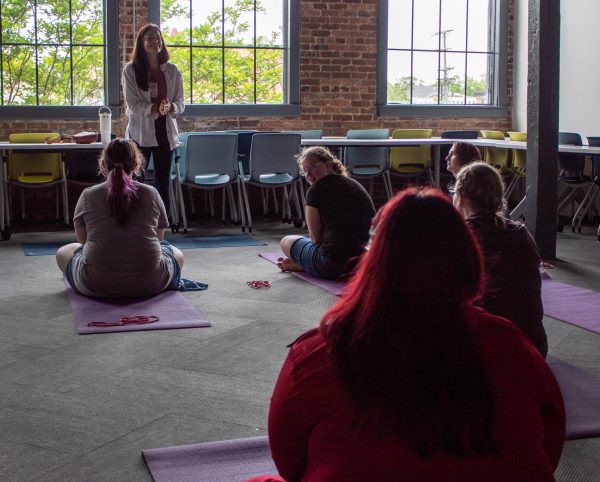Students quarantine due to exposure
September 22, 2020
As life on campus seems to slowly be returning to a sense of normalcy, multiple students have been placed in quarantine and isolation due to coming into contact or contracting COVID-19.
In an effort to stop the spread of the disease and keep students who are coming to campus safe, the University is continuing to conduct contact tracing. This is a major cause of the increasing number of quarantined students.
Contact tracing does not begin until an individual has a confirmed positive case. Those who are identified as having been in direct contact for 15 minutes or more during a 24-hour period at less than six feet within 48 hours prior to an individual who noted symptoms will be placed in quarantine.
When a group has been possibly exposed and individuals cannot be identified and the probability that the individual could have come into contact with anyone in the group, the entire group will be asked to quarantine.
It is imperative to the safety of UNA’s campus that individuals who start to experience any symptoms contact University Health Services (UHS) immediately.
“There are members from six different Recognized Student Organizations [RSOs] under quarantine, but there are also students not involved in RSOs in quarantine as we help continue to mitigate potential spread,” said the Vice President of Student Affairs, Dr. Tammy Jacques.
For those who do not become symptomatic or test positive for the disease, the length of their quarantine is 14 days from the date of exposure. This is per the Centers for Disease Control and Prevention (CDC) and the Alabama Department of Public Health (ADPH) guidelines.
Quarantine however, is not an indication of the spread of the disease. It is a proactive and precautionary measure the University is taking. While other colleges and universities are attributing their rise in cases and even closures to their Greek organizations, UNA is not. It is not just those involved in Greek life quarantining, it goes beyond that.
“Events and socialization leading up to, following, and including Bid Day were identified through contact tracing as potential exposure opportunities,” said Jacques.
The University cannot stress the importance of students and employees wearing cloth face coverings and adhering to six feet physical distancing enough.
“While separation is possible during the formal event [Bid Day], often students engage in socialization in groups before, during, and after an organized event,” said Jacques. “It is important to remind everyone, not just our students, that we must be constantly mindful of our interactions, especially when we tend to migrate toward others when engaged in conversation and the six-foot perimeter becomes easily breached.”
The University and sorority chapters took a number of precautions during fall 2020 recruitment. Recruitment took place virtually this year; but, there were some events that took place outside. All attendees were required to wear face coverings and abide by the physical distancing guidelines of the University.
Chapters that hosted individual Bid Day events and activities were asked to hold those outdoors and require face coverings unless eating or engaged in physical exercise. They were also all encouraged to social distance.
“The number of quarantined individuals changes on a daily, and sometimes hourly, basis,” explained Jacques. “Since numbers of quarantined individuals are not an indicator of virus spread and are fluid depending on individual scenarios, it is not meaningful data.”
Over the summer, the University was providing a case counter but eventually removed that resource. The University is currently working on a way to provide meaningful data to students, faculty and staff. For now, students are left to speculate about how many of their classmates have the disease.
“Individuals are quarantined either in their homes, local apartments, or in the residence halls,” Jacques explained. “If individuals test positive, then they are isolated.”
It is important to note that being placed in quarantine and being placed in isolation are different.
Quarantine is used to keep those who might have been exposed to COVID-19 away from others. Quarantine helps to prevent the spread of the disease that can occur before an individual does not know they are sick or if they are asymptomatic. Isolation on the other hand, is used to separate people who contracted the disease from those who are not infected.
“People who are in isolation should stay home until it’s safe for them to be around others,” said Jacques. “In the home, anyone sick or infected should separate themselves from others by staying in a specific ‘sick room’ or area and using a separate bathroom, if available.”
Those placed in quarantine are expected to remain so until their quarantine end date. Those who live on campus and do not abide by the quarantine requirements will be referred to the Office of Student Conduct.
Additionally, students who live at home or at an off-campus apartment are not permitted to come back to campus until their quarantine period is over. While the University has no ability to monitor those off-campus, if the University is made aware of individuals who violate quarantine, they will be referred to the Office of Student Conduct as well.
The University is expecting for its students to be responsible and to want to protect the health and well-being of others. If UHS is made aware of students who are quarantined and not abiding by the guidelines, they will notify the ADPH.
The ADPH has the authority to institute measures to protect the health of the public.
“University Health Services is in frequent contact with the Alabama Department of Public Health and the physician that is the Assistant State Health Officer provided direct instruction related to how to handle group exposure on our campus,” Teresa Dawson, the Half-Time Executive Director of Health and Well-Being, said. “I understand that 14 days in quarantine is inconvenient, but it is a short-term inconvenience as opposed to a potential lifetime of health problems or even death for some who have and will contract COVID-19.”
There should be no reason for a student to break quarantine. The University has set up a way in which quarantined individuals are able to place meal requests. Students who are living both on and off campus are also able to submit a food pantry request as well. Students may contact the pantry at 256-765-4693 or community [email protected], or the University Case Manager at 256-765-4531 if they need further assistance.
The University is encouraging both students and employees to download the GuideSafe App. The UNA Healthcheck and Exposure Notification system are both available on the app. The app will also allow individuals to report positive results to the ADPH. To download, scan the QR Code below.











